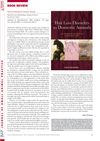 1 citations,
December 2010 in “The journal of small animal practice/Journal of small animal practice”
1 citations,
December 2010 in “The journal of small animal practice/Journal of small animal practice” The book helps veterinarians understand and treat hair loss in animals.
1 citations,
July 2006 in “American Journal of Psychiatry” Lamotrigine can cause hair loss.
 1 citations,
January 2004 in “Journal of Physiology & Pathology in Korean Medicine”
1 citations,
January 2004 in “Journal of Physiology & Pathology in Korean Medicine” Thuja orientalis extract significantly promotes hair growth in mice with hair loss.
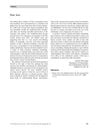 1 citations,
July 2002 in “Clinical and Experimental Dermatology”
1 citations,
July 2002 in “Clinical and Experimental Dermatology” The document concludes that understanding hair loss and its psychological impact is crucial for physicians to provide effective counseling and treatment to patients.
 1 citations,
May 2002 in “British Journal of Dermatology”
1 citations,
May 2002 in “British Journal of Dermatology” Hair loss caused by longer latent hair cycle and sudden miniaturization, not gradual follicle size reduction.
 1 citations,
January 2002 in “Dermatology + psychosomatics”
1 citations,
January 2002 in “Dermatology + psychosomatics” Most people worried about abnormal hair loss actually have psychological issues like depression or anxiety.
 1 citations,
January 2002 in “Health care on the Internet”
1 citations,
January 2002 in “Health care on the Internet” The article says Rogaine and Propecia can treat hair loss, warns about unreliable internet info, and advises talking to a doctor before using hair loss products.
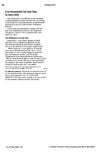 1 citations,
May 1998 in “Inpharma Weekly”
1 citations,
May 1998 in “Inpharma Weekly” Finasteride works for male hair loss only.
 1 citations,
March 1992 in “Postgraduate Medicine”
1 citations,
March 1992 in “Postgraduate Medicine” About 40% of women by age 60 experience significant hair loss, often due to androgenetic alopecia, with treatments like minoxidil available and hope for future cures.
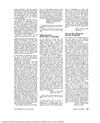 1 citations,
July 1976 in “Archives of Dermatology”
1 citations,
July 1976 in “Archives of Dermatology” Some women experienced hair loss after stopping chorionic gonadotropin injections and a low-calorie diet.
 1 citations,
March 2023 in “Frontiers in Medicine”
1 citations,
March 2023 in “Frontiers in Medicine” Topical prostaglandin analogs may help with hair growth but more research is needed.
 1 citations,
December 2022 in “JAMA Dermatology”
1 citations,
December 2022 in “JAMA Dermatology” The AI system HairComb accurately scores hair loss severity, matching dermatologist assessments.
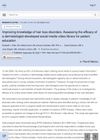 1 citations,
December 2022 in “JAAD international”
1 citations,
December 2022 in “JAAD international” Social media videos made by dermatologists significantly improved patient knowledge about hair loss.
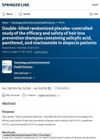 1 citations,
April 2022 in “Toxicology and Environmental Health Sciences”
1 citations,
April 2022 in “Toxicology and Environmental Health Sciences” The shampoo with salicylic acid, panthenol, and niacinamide is effective and safe for preventing hair loss in people with alopecia.
 1 citations,
April 2022 in “Dermatologic Surgery”
1 citations,
April 2022 in “Dermatologic Surgery” The Progressive Loss Risk Scale is a system that shows the long-term risks of hair restoration surgery, which can change based on factors like age and transplant area.
 1 citations,
April 2022 in “Revista Da Associacao Medica Brasileira”
1 citations,
April 2022 in “Revista Da Associacao Medica Brasileira” COVID-19 can cause different types of hair loss, and proper diagnosis by a specialist may be needed.
 1 citations,
March 2022 in “Daehanhanuihakoeji”
1 citations,
March 2022 in “Daehanhanuihakoeji” Artemisia sieversiana extract may help prevent hair loss and promote hair growth.
1 citations,
June 2019 in “Oral diseases”  1 citations,
May 2019 in “Bioactive compounds in health and disease”
1 citations,
May 2019 in “Bioactive compounds in health and disease” Certain vitamins, minerals, and foods like black raspberry extract and egg yolks can help reduce hair loss and promote hair growth.
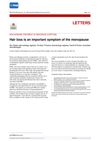 1 citations,
January 2018 in “BMJ”
1 citations,
January 2018 in “BMJ” Many women experience significant hair loss during menopause, and topical minoxidil is an effective treatment.
 1 citations,
January 2018 in “Journal of cosmetology & trichology”
1 citations,
January 2018 in “Journal of cosmetology & trichology” Hair loss lotion with specific ingredients effectively improves hair growth and thickness safely.
 1 citations,
July 2017 in “PubMed”
1 citations,
July 2017 in “PubMed” Hair loss can have negative psychological effects and treating it needs teamwork, especially from skin doctors.
 1 citations,
November 2015 in “Journal of Clinical Dermatology”
1 citations,
November 2015 in “Journal of Clinical Dermatology” Hair loss causes social and psychological stress, leading people to spend more on treatment, regardless of how severe the hair loss is.
 1 citations,
October 2014 in “Paediatrics and Child Health”
1 citations,
October 2014 in “Paediatrics and Child Health” The document concludes that proper diagnosis and management of hair loss in children require a detailed examination and understanding of various hair disorders.
 1 citations,
May 2012 in “Hair transplant forum international”
1 citations,
May 2012 in “Hair transplant forum international” Hair loss in men may be caused by inflammation triggered by hormones, and treatments reducing inflammation could potentially promote hair growth.
1 citations,
January 2012 in “Hair therapy & transplantation” New natural hair loss treatments seem safer but need more research.
1 citations,
January 2009 in “The Korean Society of Beauty and Art” Korean Wild Ginseng extract may increase hair thickness and satisfaction among users, but not significantly increase hair count.
 November 2024 in “JAMA Dermatology”
November 2024 in “JAMA Dermatology” Low-dose oral minoxidil may help with hair loss, but more research is needed.
 November 2024 in “Circulation”
November 2024 in “Circulation” GLP1-RAs may have higher reports of suicide and hair loss, but no strong evidence links them to these issues.
November 2024 in “Biochemical and Biophysical Research Communications” Abnormal gene expression related to keratin causes hair loss in certain mice.

























